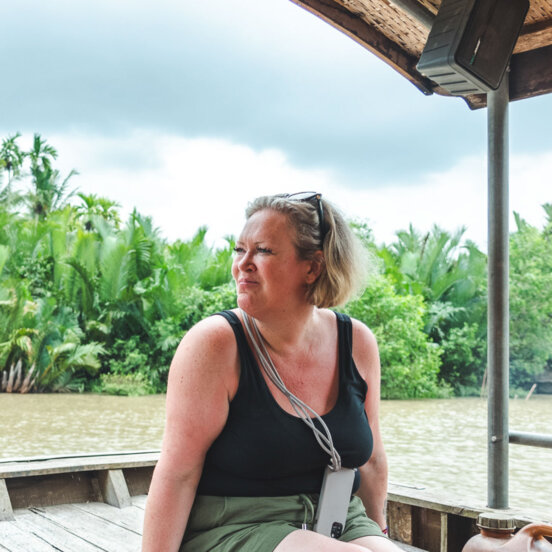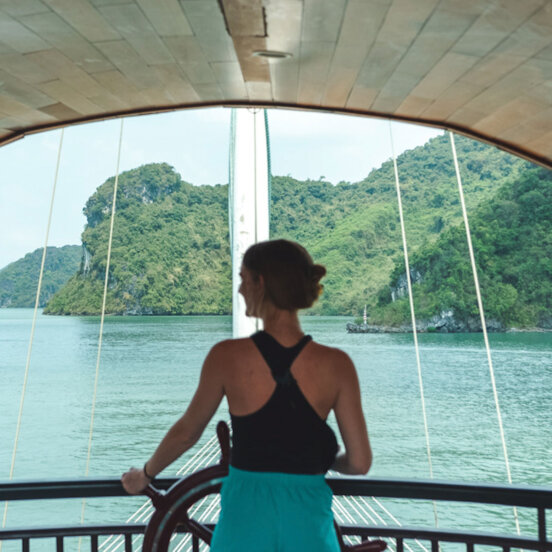5 feel-good reasons why travel can ignite lifelong friendships

It’s a funny fact of life that some of our deepest relationships can be found not just in a uni hall,, or at work, but on some random beach in Koh Phangan. Travel has a delightful way of flinging us into the path of other like-minded souls, forging lifelong friendships from an overnight bus trip to La Paz, or an impromptu bar hop in Lusaka that just so happens to be the Best Night Ever.
This unsung quality is all the more important when you consider that we’re in the midst of a friendship deficit right now. Recent research shows a fifth of adults under the age of 35 have only one or no close friends, and post-Covid loneliness is rife. Somehow, modern life with all its baggage – work pressures, family commitments, and of course, a global pandemic – has edged out a major source of joy.
This dilemma is exactly why Flash Pack has committed to make one million friendships from our group adventures. With 80% of people who travel with us already staying friends beyond their trips (reunions are all the rage), we know well the powerful link between travel and friendship.
What’s more, the connections that travelers find abroad often run deep, meaning people go from strangers to lifelong friends – all from a two-week vacay, or even just a chance encounter. Here’s why travel is such a boon when it comes to making the friendships that matter the most.
1. Great friendship means knowing yourself first

It may seem counterintuitive, but before making friends with others, you have to befriend yourself. And the beauty of travel is that it allows the rare time and headspace to do this, away from the distractions and cues of daily life. You gain perspective you wouldn’t otherwise have, surrounded by familiar routines and people who already know you. And this ability to know yourself fully is a precursor for more meaningful friendships with others.
We take satisfaction in shared experiences
“Before you can make clear-eyed choices about the people you share time and intimacy with, you have to know yourself,” says author and psychotherapist Erin Falconer, writing for Fast Company. “How can you possibly know which friendships should be cultivated and which can be allowed to fade away without knowing your values, needs, strengths, weaknesses, and goals?”
Without fully knowing yourself, “you might end up with people who don’t support you, don’t respect you, and worst of all, don’t really see you”, Falconer adds.
2. Making friends is about shared life stages

The people we make friends with in life are decided by a combination of factors, including proximity and shared interests. Shared life stage is another important element that is often overlooked. When you’re on the road, whether kayaking over waterfalls in Croatia, or partying in downtown Bogotá, you’re more likely to cross paths with fellow free-spirits.
These people won’t necessarily share your life experience – part of the fun of friendship is that it could be wildly different – but you’ll be united by your love of adventure, and a life stage in which you’re both searching for something a bit different.
Shared life stage is a way we “frequently find new friends”, writes counselor and professor Suzanne Degges-White in Psychology Today. “We take satisfaction and pleasure when spending time with people who are experiencing the same challenges, or rewards, that we are experiencing. When we move from high school to college or college to our first job, we tend to seek out the company of others who are experiencing the same transition we are.”
When it comes to Flashpackers, this transition typically surfaces as the desire to break free from the everyday and seek out moments of authentic adventure. It’s also found in a great group chemistry that comes from being at a similar age and life stage (mostly professionals in their 30s and 40s, with an innate curiosity for authentic travel and the world at large).
3. Friendships take time to cultivate

Part of the problem with friendships today is that we don’t have the time to make them. For all the progressions made in tech and productivity in recent years (or perhaps because of them), research indicates that we are, in fact, shorter on leisure time than we were 40 years ago.
According to a 2018 paper from the University of Kansas, it takes more than 200 hours of hanging out together before you can consider someone your close friend. And this means quality time, too: you can’t just work or live together, you need to interact in a way that feels meaningful.
You can’t snap your fingers and make a friend
“We have to put that time in,” says the study’s author, professor Jeffrey Hall. “You can’t snap your fingers and make a friend. Maintaining close relationships is the most important work we do in our lives – most people on their deathbeds agree.” Travel helps with this process because it carves out rare moments of profound, real-world connection – such as a day-long hike in Patagonia, or hunting down street food in Hanoi – that we wouldn’t otherwise have.
4. Shared experiences are the glue of friendships

Science shows that sharing an emotional experience with someone else ignites the brain’s reward system, making people rate those experiences as more intense compared to those who flew solo. This is true even if the shared experience in question is with a stranger, and even if it’s not a wholly positive experience (for example, those disaster travel moments that turn into a good dinner party story afterwards).
Travel, naturally, is rife with shared experience: a twilight boat journey in the Peruvian Amazon; glamping in the Jordanian desert; that time you and a fellow traveler were randomly invited to an elaborate wedding party in Singapore. These kinds of moments will bond you together forever, as you relive your experiences every time you meet.
5. Lasting friendships are a two-way street
Last but not least, research shows that true friendship is measured by the amount of reciprocity in any given relationship. In other words, both of you consider the other to be a proper friend; not just an acquaintance, a friend-of-a-friend, or someone you chat to on Instagram.
Travel gives fuel to this concept of reciprocity, mainly because it allows room for bonds to build in real life. When you’re sharing an adventure with someone, the experience is quite deep-rooted. You have the time, and the presence of both of you being in the moment together, that will decide quickly if there’s a lasting connection to build on.
Got a story or adventure that could inspire a solo traveler like you? Tag @flashpack on social or email [email protected] to be featured.










